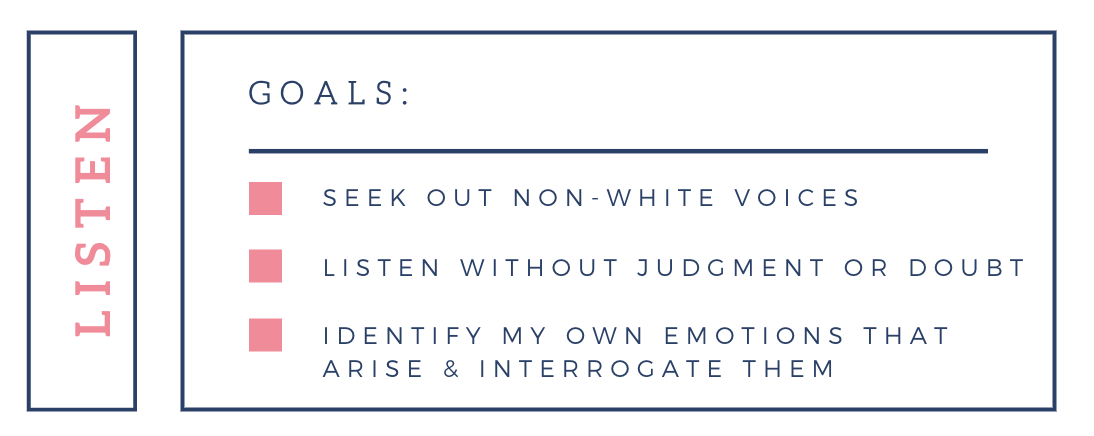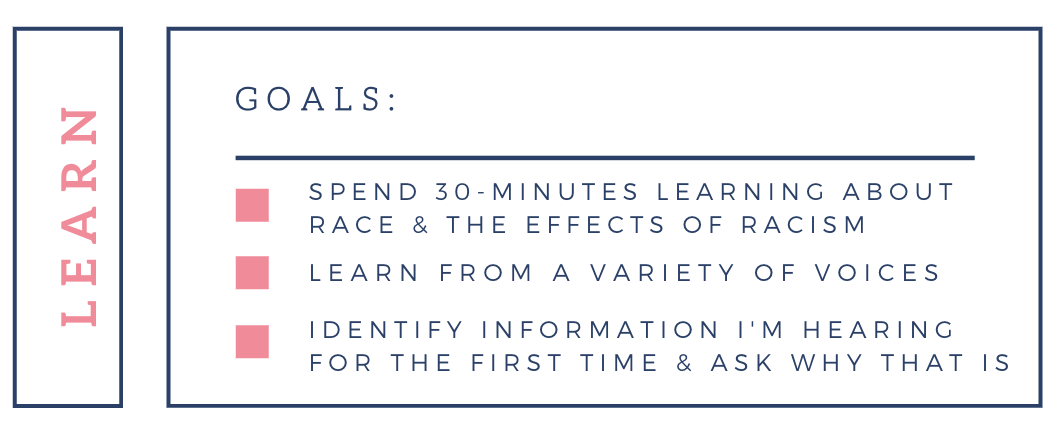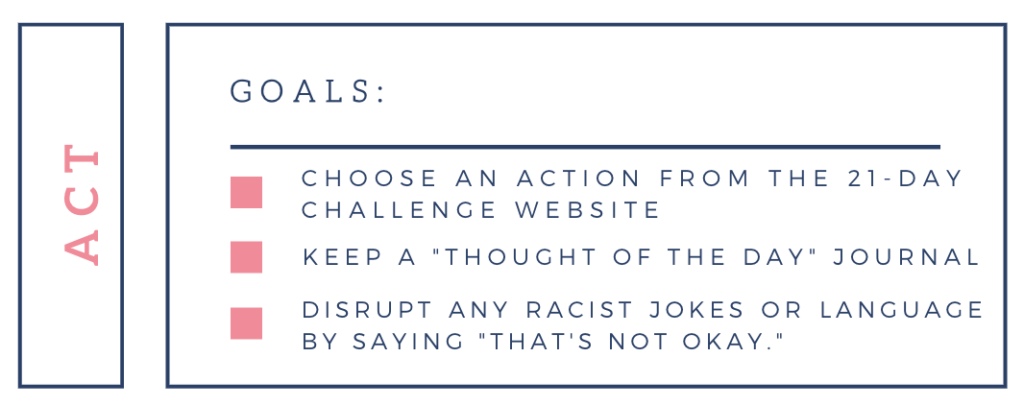
The 21-Day Challenge is not “one-size-fits-all,” so whether you are just beginning in the anti-racist struggle or have been there for decades, it’s meant to deepen your engagement and to teach you something new. We can all learn more, listen more intensely, and act more often in anti-racist ways.
Here are the core elements of the 21-Day Challenge to Build Anti-Racist Habits:
1. Commit to spending 30-minutes each day for 21 days actively cultivating anti-racism in your life.
2. Listen to the voices of non-white people with compassion and without judgment. Believe them and learn from them.
3. Use this list of resources as a starting place to learn more about anti-racism, white supremacy, and systemic oppression.
4. Reflect on what emotions arise for you as you grow in your anti-racist knowledge, perhaps keeping a “thought of the day” journal during the Challenge.
5. As you grow in your knowledge, take actions that interrupt systemic racism.
What does “Anti-Racist” Mean?
You may be hearing the term “anti-racist” a lot lately. It stems from the idea that white allies in the struggle for racial justice must not only be aware of and avoid overtly racist behaviors within themselves, they also must become active interrupters of the racism and systemic oppression they encounter. To become an anti-racist is a life-long spiritual practice, but one that Christians should cultivate, both for their own personal liberation and to participate in the acknowledgement of hundreds of years of oppression that black and brown people in our country and worldwide have suffered at the hands of the colonial Christian church. As Dr. Maya Angelou is quoted as saying, “I did then what I knew how to do. Now that I know better, I do better.” If you would like to learn more so that you can do better, the 21-Day Challenge* is a good way to grow the habit of active anti-racism in your everyday life.
The First Two Goals: Listening & Learning


Consuming media produced by black and brown people is a key element of this challenge. So much of our nation’s media (news, literature, movies, podcasts, etc.) is developed by and for white audiences, which means that we are usually not hearing the whole conversation. We have curated a list of resources on our website; feel free to start with these. But becoming adept at noticing whose voices we hear is a key part of this challenge.
Find the items that most interest you, but also let the titles of the resources challenge you. Try to listen without judgment. You can keep a personal “thought of the day” notepad to jot down any key thoughts or emotions you have. It is important to pay attention to the emotions that arise as you learn more throughout the 21-days. Are you angered by learning historical truths that you were never taught in school? Are you worried that an encounter you once had that seemed neutral to you might have hurt someone’s feelings, or caused harm? Are you amazed at the resiliency of communities of color to endure? Do not push your emotions aside, but sit with them and reflect.
The Third Goal: Anti-Racist Action

Listening and learning are meant to help us understand the context of structural racism and to notice it when it is happening. But anti-racists do not stop by noticing. They actively interrupt racism when they see it. This, too, is a habit that we as Christians need to develop. We can lean on Jesus as our model of someone who consistently worked to interrupt the status quo, and pray for the strength and courage to do so in our own lives. And we can cultivate our courage by taking increasingly brave steps along the way.
Below is a list of suggestions for action, but it is not nearly exhaustive. The more you commit to anti-racist action, the more you will be aware of ways in which you can interrupt racism in your everyday life. And a simple Google search of “anti-racist actions” will provide you even more options once you’ve considered the ones below.
Actions at Home- ACTIONS AT HOME: You can patronize non-white businesses, boycot purchasing from companies that use unpaid or low-wage prison labor, create a lending library of anti-racist books & resources to offer to friends and family, invite others to do the 21-Day Challenge with you, bring up racism at the dinner table and have honest conversations with friends and family, follow black and brown voices in your social media and share their articles, and most of all continue to identify and challenge your own internal biases with lifelong learning and reflection – keeping a personal journal can help track your progress.
- ACTIONS IN PUBLIC: Participate in a voter registration drive – particularly one that targets communities of color. Participate in #BlackLivesMatter protests. Donate to the Poor People’s Campaign and its member organizations. Write your elected officials (particularly at the local level) to encourage their enactment of anti-racist policies and ask them to provide “racial impact statements” for new legislation. Wearing a mask in public to help prevent coronavirus is an act of anti-racism because communities of color are suffering most from Covid-19. Tip particularly well when you have brown or black waiters, service industry or delivery workers, and treat them with kindness.
- BECOME AN ACTIVE BYSTANDER: Get a phrase ready (ex. “That’s not okay!”) and be prepared to use it if you encounter someone using racial slurs or jokes, or worse, actively harassing. Getting involved in this way is called being an “Active Bystander,” and there is training available to help us know what to say and how to react. Often racists are empowered by white silence, and many of us were raised with the notion that “we shouldn’t dignify bullies with a response.” However, our neighbors of color aren’t able to ignore these things, and we can help shoulder the burden. Here is a website outlining the “5 D’s” of active bystander options in any given situation: https://www.ihollaback.org/bystander-resources/
Tracking Your Progress
It may not feel like 30-minutes each day is much time (and if you want to spend more, wonderful), but unless we are intentional about building habits they often fall by the wayside. So, we have created a worksheet to help you track your progress through the 21-Day Challenge. You’ll see the link to download and print the PDF below. Perhaps keep it near your computer or favorite reading nook, and mark it with which goals you have met each day.
*First Parish Truro’s 21-Day Challenge is inspired by the “21-Day Racial Equity Habit Building Challenge” by Debbie Irving, author of “Waking Up White,” which has been adapted for many different institutional settings. Here is her Facebook page if you would like to connect with her community of learning.

